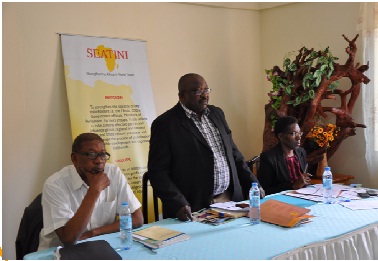By Regina Kayoyo
 The African Charter on the Rights and Welfare of the Child (African Children‘s Charter) was adopted by the then Organization of African Unity in Addis Ababa, Ethiopia on July 11, 1990 and came into force on November 29, 1999. In the same year, the Organization of African Unity declared June 16, as the Day of the African Child.
The African Charter on the Rights and Welfare of the Child (African Children‘s Charter) was adopted by the then Organization of African Unity in Addis Ababa, Ethiopia on July 11, 1990 and came into force on November 29, 1999. In the same year, the Organization of African Unity declared June 16, as the Day of the African Child.
This day honors those who participated in the Soweto Uprising in 1976 in South Africa. On that day, about 10,000 black schoolchildren marched in a single file more than half a mile long, protesting the poor quality of their education and demanding their right to be taught in their own language. With a loss of over 700 children who met with fierce police brutality, we remember their sacrifice every year as their efforts continue to raise awareness of not only the continuing need for improvement of the education provided to African children, but also protecting all children’s rights.
16th June marked 25 years of celebrating the Day of African Child, these celebrations were held under the theme, ‘Conflict and Crisis in Africa: Protecting all children’s rights’. To commemorate this day, FRA held a dissemination workshop in Soroti on the linkage between the right to food and child trafficking.
 Many people in Uganda, regardless of whether they are rights holders or rights bearers, have limited appreciation and knowledge of the right to food as an entitlement with duties and responsibilities but also the consequences of its abuse. In this regard, FRA sought to inform and increase citizen’s awareness of their right to food, entitlements and vigilance on issues that hinder people from enjoying this right as well as the far reaching consequences of failure to attain this right which among others include children’s vulnerability trafficking.
Many people in Uganda, regardless of whether they are rights holders or rights bearers, have limited appreciation and knowledge of the right to food as an entitlement with duties and responsibilities but also the consequences of its abuse. In this regard, FRA sought to inform and increase citizen’s awareness of their right to food, entitlements and vigilance on issues that hinder people from enjoying this right as well as the far reaching consequences of failure to attain this right which among others include children’s vulnerability trafficking.
Child trafficking has been defined at the recruitment, transportation, transfer, harbouring or receipt of children, by means of the threat or use of force or other forms of coercion, or of the giving or receiving of payments or benefits to achieve the consent of a person having control over the child, for the purpose of exploitation. Although not a widely known phenomenon, this gravely prevalent practise can take the censored form of child movement and transfers from one area to another.
Among the objectives of this gathering was the need to spread awareness on this practise as the most common and worst form of violence against children especially the girl child, that exposes them to all forms of vulnerabilities to abuse. It is a very serious human rights and development issue that is affecting children in many parts of Uganda although it’s worse in vulnerable post conflict areas. Children are trafficked primarily because of their vulnerability caused by the rampant poverty.
Much as poverty constitutes of numerous aspects, it has been further established that lack of adequate food is one of the major factors, which forces parents and children alike into vulnerability to child trafficking. Limited food makes it difficult for children to concentrate in school, it also forces poor parents into surrendering their children to potential traffickers.
 In the promotion of human rights and good governance, it has become evident that hungry populations are vulnerable to a number of shocks and their resilience is minimal and therefore they can’t actively participate in pursuing other human rights. As such, the right to food is the only right in the Bill of Rights that is described as “fundamental”. This right should thus be held as such, especially for children.
In the promotion of human rights and good governance, it has become evident that hungry populations are vulnerable to a number of shocks and their resilience is minimal and therefore they can’t actively participate in pursuing other human rights. As such, the right to food is the only right in the Bill of Rights that is described as “fundamental”. This right should thus be held as such, especially for children.
So what can be done then, stakeholders that this gathering proposed the need for an in-depth investigation on the causes of child trafficking which could inform multi-sectoral actors to facilitate well-co-ordinated multi-sectoral interventions to address the problem of child trafficking. Many proposed awareness campaigns on the negative effects of child trafficking (on the victim, household and community), with target-specific programmes including the children, the need to boost agricultural production through the provision of improved planting material, extension information among other was suggested as well as an approach to settling the food insecurity issue in the household.










